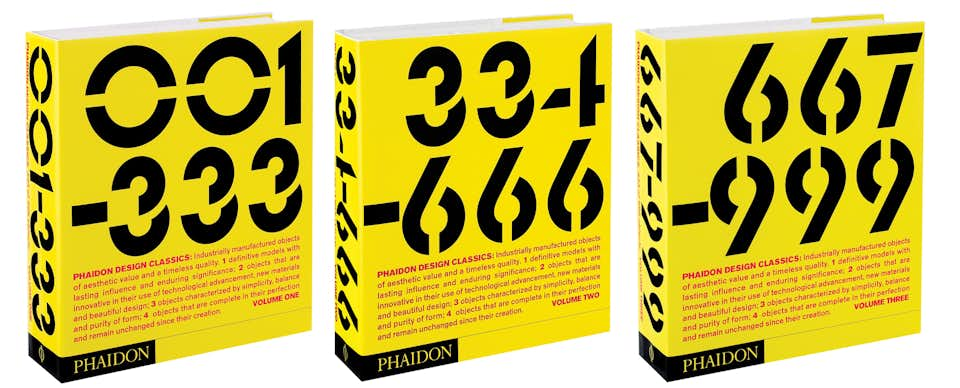
Phaidon Design Classics is a collection of 999 objects representing the entire history of design. It’s published in three large volumes, each profiling 333 objects: Pioneers (001–333), Mass Production (334–666), and New Technologies (667–999). (The Spanish edition, 1,000 Objectos de culto, includes an extra object, the iPhone. The Design Book, a mini version with 500 objects, is also available.)
The focus is on industrial design rather than graphic design, as each of the 999 entries is a physically manufactured object. Each product is represented by one or more large photographs, and each of the three volumes has more than 1,000 pages.
The Design Encyclopedia by Mel Byars is more academic, and David Raizman’s History of Modern Design has more historical context, though they focus on designers and styles whereas Phaidon Design Classics celebrates the products themselves. Perhaps the objects are over-fetishised, and some of the text seems too much like advertising copy (for example: “Any desk graced with a Rolodex marks the owner out as an efficient, busy, and well-connected individual”), though this is certainly the most comprehensive design collection ever published.
The focus is on industrial design rather than graphic design, as each of the 999 entries is a physically manufactured object. Each product is represented by one or more large photographs, and each of the three volumes has more than 1,000 pages.
The Design Encyclopedia by Mel Byars is more academic, and David Raizman’s History of Modern Design has more historical context, though they focus on designers and styles whereas Phaidon Design Classics celebrates the products themselves. Perhaps the objects are over-fetishised, and some of the text seems too much like advertising copy (for example: “Any desk graced with a Rolodex marks the owner out as an efficient, busy, and well-connected individual”), though this is certainly the most comprehensive design collection ever published.
